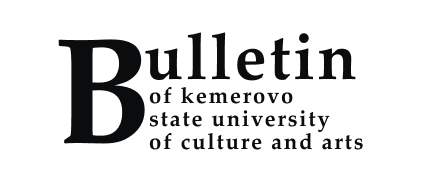UDC index:
УДК 372.881.1
DOI:
Article ID in the RSCI:
Article file: Download
Information about authors: Podgornaya Ekaterina Arturovna, PhD in Philology, Associate Professor of Department of Humanities, Plekhanov Russian University of Economics (Kemerovo branch) (Kemerovo, Russian Federation). E-mail: podgornaia.ea@kemerovorea.ru Demidenko Kseniya Anatolyevna, PhD in Philology, Associate Professor, Associate Professor of Department of Humanities, Plekhanov Russian University of Economics (Kemerovo branch) (Kemerovo, Russian Federation). E-mail: demidenko.ka@kemerovorea.ru
Annotation: One of the urgent problems of modern education system in Russia corresponds to the strategic tasks faced by the country. Being the integral part of the global strategy, development of Russia’s international relations is impossible without broad intercultural communication. Significant experience in teaching foreign languages has been accumulated in local educational tradition. At the same time, modern world requires intensification of this sphere of knowledge. The purpose of the research is to analyze development of the systems of intensive foreign language studies in Russia. The main tasks are to study the development of teaching the foreign languages in prerevolutionary Russia and consider the evolution of teaching the foreign languages in the USSR. The article is based on basic theoretical methods of scientific research (analysis, synthesis, historical method, etc.). In prerevolutionary Russia intensive methods of teaching the foreign languages developed and wereapplied to a limited extent in both, state educational institutions and in private ones, as well as in private practice. In the USSR the state system of language education was gradually built up. Concerning the techniques of teaching the foreign languages in the USSR, there were traditional, communicative, and self-devised (combining traditional methods and communicative techniques with elements of creative comprehension of the language) methodologies. One of the main reasons for slow introduction of intensive methods of studying the foreign languages in Russia over the past 150 years, in our view, lies in the institutional field. As a result of the study, the advantages and disadvantages of the system of language education and the conditions for increasing its competitiveness were introduced.
Keywords: intensive methods of teaching, foreign languages, communication, skills, national policy, Russia, USSR, competitiveness.
DOI:
Article ID in the RSCI:
Article file: Download
Information about authors: Podgornaya Ekaterina Arturovna, PhD in Philology, Associate Professor of Department of Humanities, Plekhanov Russian University of Economics (Kemerovo branch) (Kemerovo, Russian Federation). E-mail: podgornaia.ea@kemerovorea.ru Demidenko Kseniya Anatolyevna, PhD in Philology, Associate Professor, Associate Professor of Department of Humanities, Plekhanov Russian University of Economics (Kemerovo branch) (Kemerovo, Russian Federation). E-mail: demidenko.ka@kemerovorea.ru
Annotation: One of the urgent problems of modern education system in Russia corresponds to the strategic tasks faced by the country. Being the integral part of the global strategy, development of Russia’s international relations is impossible without broad intercultural communication. Significant experience in teaching foreign languages has been accumulated in local educational tradition. At the same time, modern world requires intensification of this sphere of knowledge. The purpose of the research is to analyze development of the systems of intensive foreign language studies in Russia. The main tasks are to study the development of teaching the foreign languages in prerevolutionary Russia and consider the evolution of teaching the foreign languages in the USSR. The article is based on basic theoretical methods of scientific research (analysis, synthesis, historical method, etc.). In prerevolutionary Russia intensive methods of teaching the foreign languages developed and wereapplied to a limited extent in both, state educational institutions and in private ones, as well as in private practice. In the USSR the state system of language education was gradually built up. Concerning the techniques of teaching the foreign languages in the USSR, there were traditional, communicative, and self-devised (combining traditional methods and communicative techniques with elements of creative comprehension of the language) methodologies. One of the main reasons for slow introduction of intensive methods of studying the foreign languages in Russia over the past 150 years, in our view, lies in the institutional field. As a result of the study, the advantages and disadvantages of the system of language education and the conditions for increasing its competitiveness were introduced.
Keywords: intensive methods of teaching, foreign languages, communication, skills, national policy, Russia, USSR, competitiveness.
